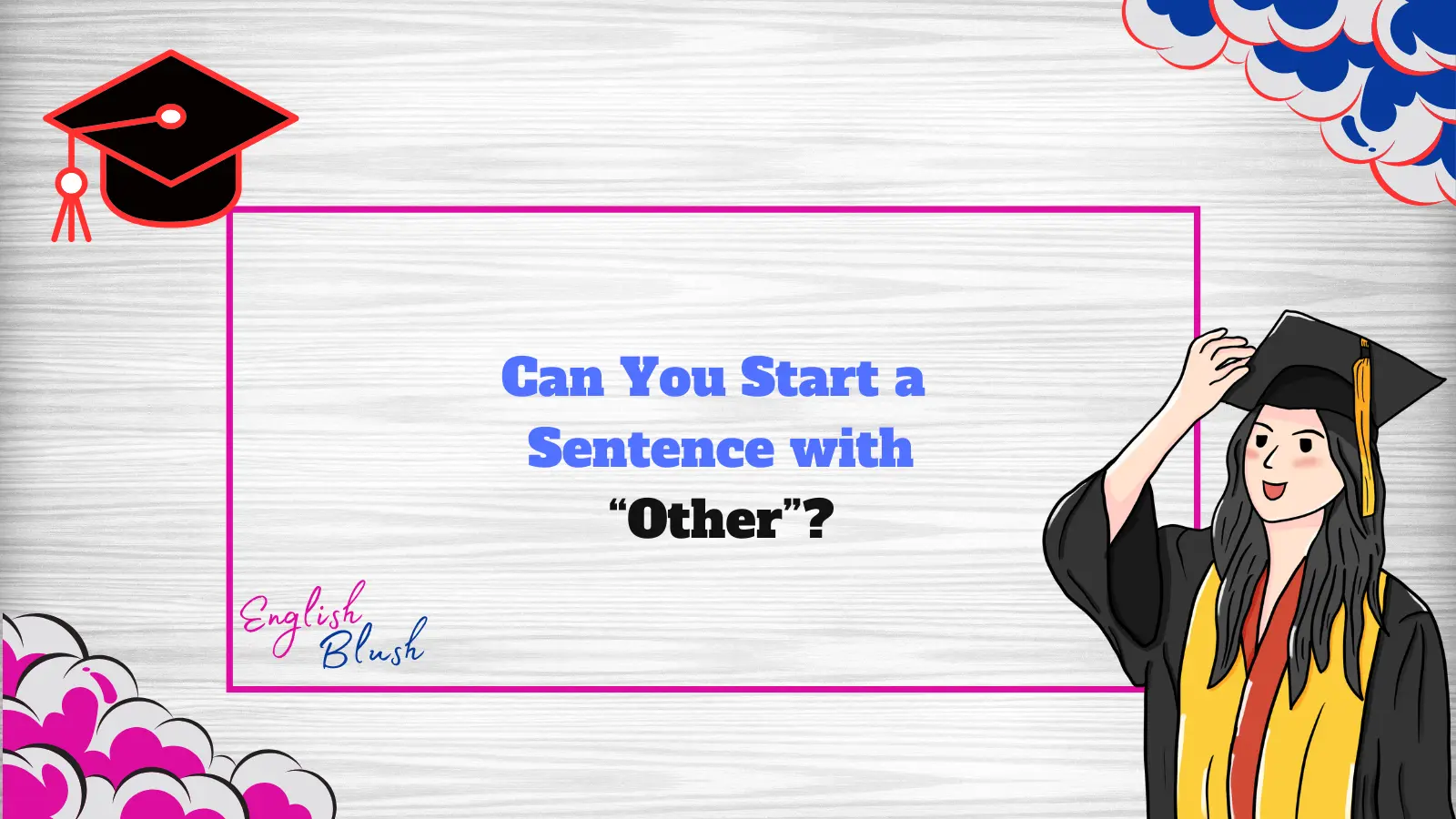Many people wonder if it is okay to start a sentence with “Other.” The quick answer is: Yes, you can! Using “Other” at the start of a sentence is perfectly acceptable in both formal and informal writing, as long as it fits the context. In this article, we will explore when and how to use “Other” effectively, provide simple examples, and suggest alternatives you can use.
What Does “Other” Mean?
“Other” is a word that refers to something different or additional from what is already mentioned. It can describe people, objects, or ideas that are not the same as the ones being discussed.
For example:
- I like this option. Other choices don’t appeal to me.
In this case, “other” talks about different choices from the one mentioned earlier.
Is It Grammatically Correct to Begin with “Other”?
Yes, starting a sentence with “Other” is grammatically correct. The key is to ensure the sentence makes sense and is relevant to the topic. Writers often use “Other” at the start of sentences to connect ideas or introduce new information.
When Can You Start a Sentence with “Other”?
You can use “Other” at the beginning of a sentence in several situations:
- To Contrast Ideas
“Other” helps highlight differences between ideas or objects.Example:- This method works for most problems. Other approaches may take longer but are more accurate.
- To Add Information
“Other” can introduce additional points or options.Example:- Some people prefer coffee in the morning. Other people enjoy tea instead.
- To Discuss a New Topic
Sometimes, “Other” begins a sentence to shift focus to a related subject.Example:- This article covers basic grammar. Other articles on this site discuss advanced tips.
Formal Context
In formal writing, “Other” is often used to sound clear and professional. It is common in essays, reports, and academic texts when comparing ideas or providing additional information.
Examples in Formal Writing:
- One study shows this method works well. Other studies suggest alternative solutions.
- The first option is cost-effective. Other options offer better quality but come at a higher price.
Tips for Using “Other” in Formal Writing:
- Use “Other” to keep your ideas organized.
- Combine “Other” with specific details for clarity.
- Avoid overusing “Other” to prevent repetition.
Informal Contexts
In informal settings, like casual emails or blog posts, “Other” can create a friendly tone. It adds variety and makes writing more engaging.
Examples in Informal Writing:
- I love hiking in the summer. Other activities I enjoy include swimming and biking.
- We went to the museum last weekend. Other places we considered were the park and the zoo.
Tips for Using “Other” in Informal Writing:
- Keep sentences short and simple.
- Mix “Other” with personal anecdotes or examples.
Common Mistakes to Avoi
- Lack of Clarity
Ensure it’s clear what “Other” refers to in your sentence.Confusing:- This product is affordable. Other is too expensive.
Clear: - This product is affordable. Other products are too expensive.
- This product is affordable. Other is too expensive.
- Overusing “Other”
Repeating “Other” too often can make your writing sound dull. Try synonyms or rephrase your sentences. - Vague References
Be specific when using “Other” so readers understand what you mean.
Alternatives to “Other”
Sometimes, you might want to replace “Other” for variety or to match a specific tone. Here are some alternatives:
- Different
Example: Some books are easy to read. Different books require more focus. - Another
Example: We tried one option. Another option worked better. - Additional
Example: This course covers the basics. Additional materials are available for advanced learners. - Further
Example: These findings are promising. Further research is needed to confirm them.
Practice with Examples
Let’s rewrite some sentences using alternatives to “Other”:
- Original: Some people like cats. Other people prefer dogs.
Rewrite: Some people like cats. Different people prefer dogs. - Original: This recipe is quick to make. Other recipes take longer but taste great.
Rewrite: This recipe is quick to make. Additional recipes take longer but taste great. - Original: The first solution worked well. Other solutions were less effective.
Rewrite: The first solution worked well. Further solutions were less effective.
Why “Other” Is Useful
“Other” is a versatile word that keeps your writing organized and clear. It helps connect ideas, compare options, and add depth to your message. Whether in formal or informal writing, “Other” makes it easy to introduce new points without sounding repetitive.
By understanding how and when to use “Other,” you can improve your writing skills and make your sentences flow better.
Final Thought
Starting a sentence with “Other” is not only correct but also a helpful way to link thoughts, contrast ideas, and share more details. Just remember to keep your sentences clear and choose alternatives when needed to add variety.
Next time you write, try starting a sentence with “Other.” You’ll see how it brings balance and flow to your writing!





